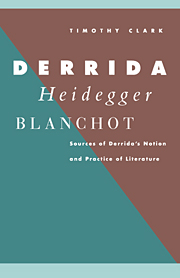3 - Derrida and the literary
Published online by Cambridge University Press: 15 August 2009
Summary
It is still common to introduce Derrida's work either as a radicalisation of structuralism, especially in relation to the diacritical nature of the sign, or as a continental version of the holism/relativism prominent in Anglo-Saxon philosophy. The term ‘post-structuralism’, symptomatic of this reception, still obscures, however, the exact nature of the provenance of Derrida's writings in the French philosophical-literary scene, where Heidegger and Blanchot are inescapable.
In ‘Force and Signification’ (1963) (WD, pp. 3–30), Derrida gives an account of structuralism. In addition he offers an opposing account of literary language which is broadly in line with the work discussed in the previous two chapters. Literary language is characterised mainly with reference to ontological questions. As with Heideggerian Dichtung, the literary is peculiar in relating to that which is in excess of any entity – ‘the essential nothing on whose basis everything can appear and be produced within language’ (WD, p. 8):
The pure book, the book itself, by virtue of what is most irreplaceable within it, must be the ‘book about nothing’ that Flaubert dreamed of… This emptiness as the situation of literature must be acknowledged by the critic as that which constitutes the specificity of his object, as that around which he always speaks.
(WD, p. 8).In itself this passage is indistinguishable from much contemporary work by Blanchot. The consideration that this absence-of-any-entity may never become the object of any representation renders the literary a peculiar structure of appearance as withdrawal.
- Type
- Chapter
- Information
- Derrida, Heidegger, BlanchotSources of Derrida's Notion and Practice of Literature, pp. 108 - 149Publisher: Cambridge University PressPrint publication year: 1992
- 1
- Cited by



